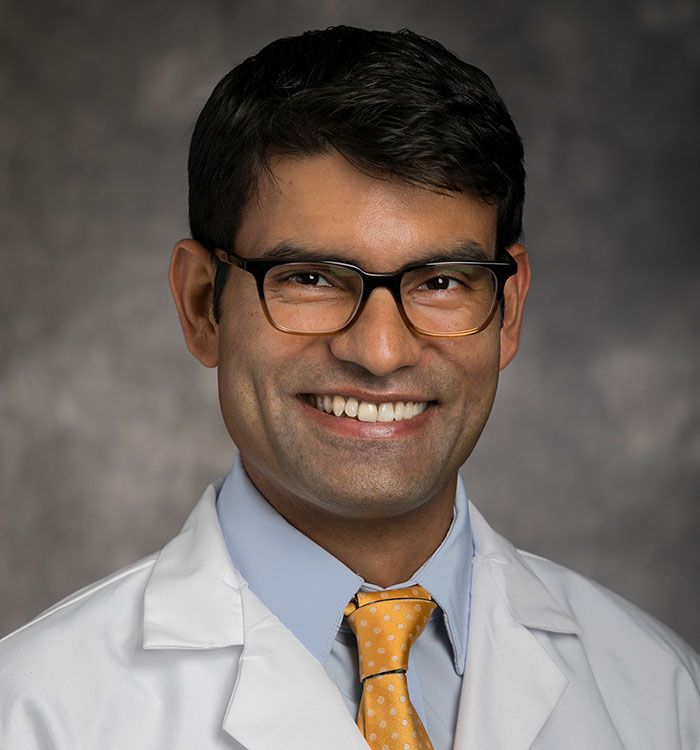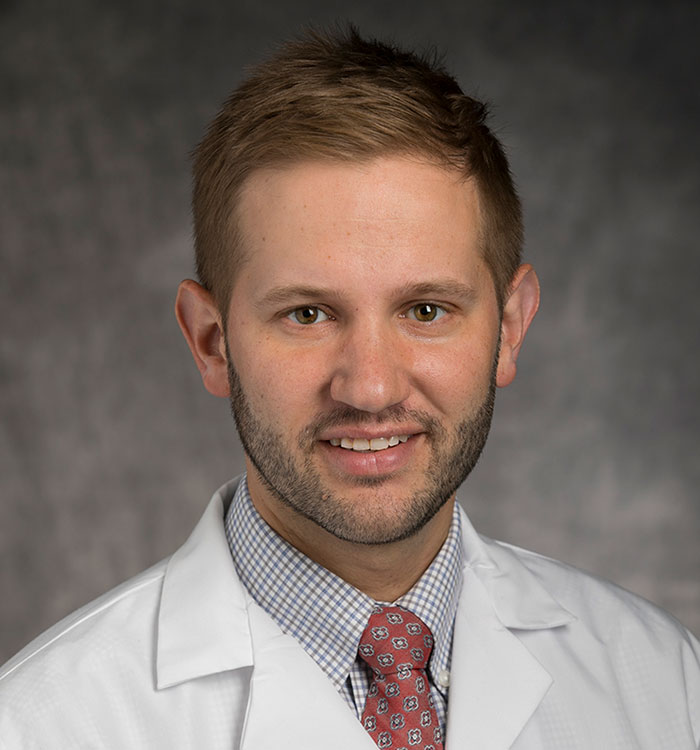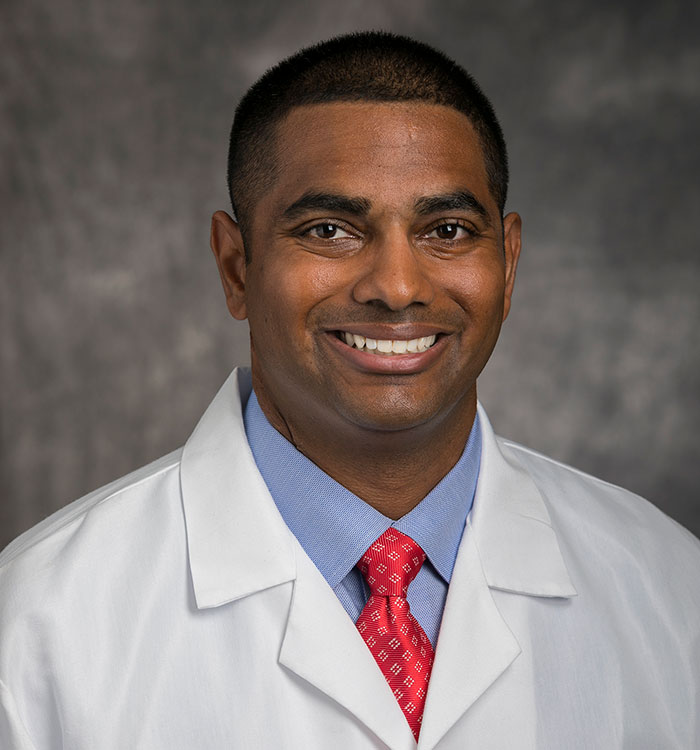New Experts in Urologic Oncology and Onco-Fertility Broaden Treatment Options at UH Seidman Cancer Center
March 08, 2020
Specialties include post-cancer reconstruction, retroperitoneal lymph node dissection for advanced testicular cancer and pre-treatment onco-fertility services
Innovations in Cancer | Winter 2020
UROLOGIC RECONSTRUCTION
What started as a personal challenge to master the technically demanding work of urologic reconstruction has led to a passion for helping underserved patient populations. Shubham Gupta, MD, FACS, Director of Gender and Sexual Diversity Services and Division Chief of Reconstructive Urology, University Hospitals Urology Institute, and Associate Professor, Case Western Reserve University School of Medicine, specializes in reconstructive surgery for cancer survivors. He is also establishing Ohio’s first comprehensive, multidisciplinary gender affirmation program.
 Shubham Gupta, MD, FACS
Shubham Gupta, MD, FACSPrior to coming to Cleveland, Dr. Gupta served as Chief of the Division of Reconstructive Urology for Chandler Medical Center at the University of Kentucky, where he was recognized two consecutive years for excellence in teaching. Before that, he completed a prestigious fellowship in reconstructive urology and genitourinary cancer survivorship at Duke University. His expertise includes many nuanced and challenging aspects of genitourinary reconstruction and urologic surgery.
One important area of expertise for Dr. Gupta is patients who experience post-cancer care complications. “Cancer is not just a snapshot,” says Dr. Gupta. “It changes who people are and continues to affect the rest of their lives.”
Genitourinary sequelae from cancer surgery and radiation can manifest even years later. Dr. Gupta’s goals for cancer survivorship services include providing multidisciplinary care that involves a combination of medical, surgical and behavioral experts. “There are close to 20 million cancer survivors in the U.S.,” he says “Who will care for these patients and address their ongoing needs?”
Cancer treatment-related genitourinary complications that Dr. Gupta treats include:
- Urethral stricture
- Post-prostatectomy complications
- Rectourethral fistula
- Devastated bladder
- Bladder neck contracture
- Incontinence
- Sexual dysfunction
As both the nascent gender affirmation and cancer survivorship programs continue to develop at UH, the focus remains on improving quality of life through transformative care. “These are challenging patient populations, but when we are able to help these individuals, it is extremely gratifying,” says Dr. Gupta. “We are shining a light on University Hospitals because few places are offering these services.”
UROLOGIC ONCOLOGY
“This is an exciting time within our department,” adds Adam Calaway, MD, MPH, Urologic Oncologist at UH Seidman Cancer Center and UH Urology Institute and Assistant Professor, School of Medicine. “There is new energy and investment from the hospital and an influx of physicians who are enthusiastic about working together.”
 Adam Callaway, MD, MPH
Adam Callaway, MD, MPHWith expertise in the treatment of urologic oncology, including testicular, kidney, prostate and bladder cancer, Dr. Calaway has specialized training in retroperitoneal lymph node dissection (RPLND), a high-risk surgery for advanced testicular cancer. He completed his residency and fellowship at Indiana University, which is world-renowned for changing the outcomes for this disease. Prior to 1970, the cure rate was less than 10 percent. Today, the overall survival rate for testicular cancer is greater than 95 percent, according to the Testicular Cancer Society.
“Because mortality rates are so low, in recent years the focus has been on altering the morbidity of the disease by reducing chemotherapy toxicity and improving its tolerability, carefully selecting patients and improving recovery for those who need aggressive surgery — without diminishing treatment effectiveness,” says Dr. Calaway. “It is crucial to have providers who are comfortable with the nuances of managing this complex disease.”
As testicular cancer spreads, retroperitoneal lymph nodes are affected. RPLND is a highly specialized open surgery, in part because the retroperitoneum is surrounded by critical arteries and veins. Dr. Calaway has successfully performed the complex procedure more than 150 times. His training and expertise offer patients throughout the geographic region the option to seek transformative testicular cancer care closer to home.
Dr. Calaway is also in the process of developing comprehensive preoperative, perioperative and postoperative protocols to improve outcomes for patients undergoing cystectomy for advanced bladder cancer. “Cystectomy is a long, complicated surgery with fairly high rates of perioperative morbidity,” says Dr. Calaway. “The concept of prehabilitation is gaining some attention nationally.” The idea is to connect patients to multidisciplinary health services prior to surgery to help them make changes that support their recovery process. Some examples include physical therapy, cardiovascular fitness and nutrition.
“It is rewarding to make a broader impact on outcomes that goes beyond day-to-day patient care,” he says. “Fortunately, there is a wealth of opportunity for collaboration at University Hospitals, both in clinical care and academic research.”
MALE REPRODUCTION AND SEXUAL HEALTH
Another recent addition to University Hospitals is Nannan Thirumavalavan, MD, Chief of Male Reproductive and Sexual Health at University Hospitals Urology Institute and Assistant Professor, School of Medicine. Dr. Thirumavalavan joined UH to lead a newly established division that will focus on providing leading comprehensive care for men, emphasizing fertility and sexual healthcare. “UH has a pioneering and successful in vitro fertilization [IVF] program,” he says. “This is a great opportunity to provide the male component of fertility evaluation and treatment.”
 Nannan Thirumavalavan, MD
Nannan Thirumavalavan, MDA graduate of Boston University School of Medicine, Dr. Thirumavalavan recently completed a Fellowship in Male Reproductive Medicine and Surgery at Baylor College of Medicine in Houston, Texas. For the past two years, he was recognized as the NIH K12 Research Scholar at Baylor’s Center for Reproductive Medicine, and he has specific interest in reproductive and sexual health in men with chronic disease.
Another key area of interest is onco-fertility.
Men seeking reproductive healthcare at UH receive a full fertility evaluation. Services may include:
- Genetic screening
- Semen analysis
- Intracytoplasmic sperm injection for low sperm count
- Hormone testing and therapy
- Ultrasound evaluation
At UH, fertility physicians work in concert with endocrinologists, geneticists, embryologists and andrologists to offer expert reproductive care with compassion and understanding. Couples participate in developing a plan tailored to their individualized fertility challenges. “We are unique in our ability to offer such comprehensive services,” says Dr. Thirumavalavan. “For example, we are able to have embryologists present to evaluate sperm count and function at the time of extraction. Not many places have the resources to provide that level of coordinated care.”
For more information about urologic oncology or onco-fertility services for men offered at UH or to refer a patient, call 216-553-1240.


